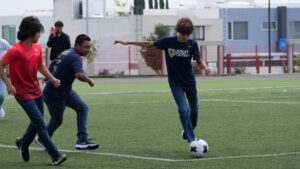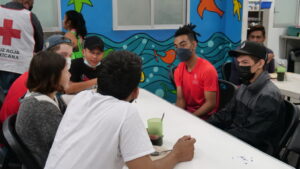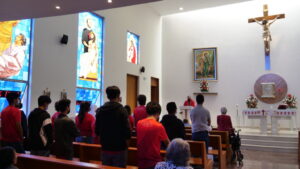Jesuit, unlike many high schools, offers a compressive experience abroad for service. This summer I had the pleasure of going on the “Encuentro” exchange student and service program to Guadalajara, Mexico. This trip was something special and an incredibly unique experience. It was very eye-opening and changed my view on many things.
Preface
Encuentro’s biggest difference compared to other trips is that you stay with a host family. In our case, it was one student per family. This leads you to become fully immersed in the family. You become not a guest of the family, but a genuine family member. You eat what they eat, you do what they do, and in my case, you lose a lot of FIFA games too. The “brother” you are assigned with is of similar age and grade and goes to the Jesuit High school.
El Instituto de Ciencias is where you take the education portion of your stay. The school is structured similarly to schools like Prestonwood or Parish, where you begin from an early age all the way to Highschool. Guadalajara unlike Dallas has gorgeous weather, sitting in the mid 70’s, allowing the schools to be open with large courtyards and open windows. This is common throughout Jalisco, the Mexican State where Guadalajara is located, because of this beautiful weather.
Life as a Foreigner
After landing and making it through customs, you are then met with your family, standing there with wide smiles and a sign with your name on it. Some people were nervous of being in a new country, and for some those smiles brought relief and a sense of comfort. My family had three members present. The mom and dad, Sra. Gabby and Sr. Marcello, with their youngest son Emilio who goes by Emi.
This family would turn into my family away from home. Showing me so much kindness where I could ask for more love. In recent years there has been an increased stigma toward people from Mexico. Slandering them in many ways throughout the news, social media, and general journalism. Going into this trip, I didn’t know what to think, as horrible as it sounds. Looking back at it, it reveals how much other people’s opinions can sway your own and how hurtful these opinions can really be without realizing it. However, this immediately changed.
The best example of this was bonding over sports. The day after landing, Emi and I were still warming up to each other. Then, we went to the local park to play soccer where strangers became brothers. In the span of 2 hours, the simple game of soccer made my complete viewpoint change. I saw Emi, not as a friend but as a brother. This small moment compliments this trip’s constant theme: Get rid of your opinions and let yourself live in the moment.

Learning to Live in the Moment
As simple as this phrase may sound, it can be challenging at times. Many people felt this through becoming homesick. Away from one’s family can be really hard. In the beginning, i felt this way. I missed my room, my bed, and especially my dog. However, once you get over this obstacle, every moment after feels substantially more special. For me, this moment was visiting a pueblo. Pueblos are villages that have earned this title for keeping their architecture, culture, and history preserved. Up in the mountains overlooking Guadalajara lies the pueblo of Talpalpa. On this mystical drive up into the mountains is when it hit me that this whole trip was something that I might never experience again. You have to seize each moment and live it to the fullest. I would never see that random cactus or that dorky dog in the middle of the plaza. Too many times, as travelers many seem to be focused more on their phones rather than their experience. They look for Instagram or Snapchat notifications rather than look out the window. You can take all the photos you love but at some point, the phone has to be face down or it was like you truly were never there. Your Instagram followers can wait but those around have a finite amount of time to spend with you.
Serving Those in Need
After all this information, it seems like the service portion was drowned out of the main narrative. However, it was the most prominent part of the trip. There were four events in which we participated in.
FM Cuatro

Our first and fourth experience was serving at an immigrant Center. FM Cuatro (FM4) serves as a safe haven for migrants. We went to one of many that lie on a rail system leading from southern Mexico all the way up to the border through several different complicated and often dangerous routes. Migrants board these often cramped spaces in an attempt at a better life. However, many can be injured as they are flung off the train or outright killed from the brutal journey. FM4 was created in order to give travelers a resting place. For example, upon entering one is greeted with smiles by the staff, given fresh clothes, and warm food. These little actions have everlasting effects as it changes the morale of the individual. Many undergo severe trauma without this they could lose hope.
While there I served as a cook and cleaner in the kitchen. Even though it was seemingly monotonous work, cutting vegetables and cleaning dishes, it taught me to appreciate people’s efforts in changing others’ lives. This came from talking with the staff to see the complicated and often expensive planning and execution to run a center successfully like this. There is so much behind the scenes that goes into helping others. Sometimes the world can seem as if there is no good. However, people like the staff at FM4 are a clear-cut example of truly good in the world who sacrifice their time and effort to help nurture and protect the most vulnerable.
Furthermore, the fruits of their labor come from the actual conversation with the migrants themselves. The men and women who I talked to were the nicest people. A little nervous talking to new people, once they opened up their stories were so interesting and really put into perspective how brutal the journeys are and why many people do it. For example one of the men was looking to reach America and hopefully attain a job. A job was very important to him so he could send money back to his family. This was so that hopefully they could reach America too and be reunited as a family. another man stated that he wanted to escape the violence in Guatemala. He saw it as unsafe land and decided for his survival to leave his home fearing for his life. Now, you would think after hearing these stories that you would have nothing in common with these men. However, you cannot forget they are still human like me and you. After their stories, we began talking. Discussions, especially with teenage boys always seem to come back to one subject; sports. We talked for a while about soccer as it was the sport we had in common. Over time we began to laugh and it became not two different types of people but one large group of individuals I never would have thought that the argument over Messi and Ronaldo would allow me to connect with migrants. Many think that there are no common interests with people, but if you look hard enough you will find that we are all not so different.
Padre Tezza
Our next service event was at a small catholic nursing home. In this specific home, many of the residents lack or do not receive many contacts from their family and friends. We were there in hopes to help their loneliness by giving them someone to talk to and helping the staff with tasks. Upon arrival, we gathered together and had a mass. In the center of the area was a beautiful quaint chapel. We celebrated mass with the nuns who worked in the home. After that, we helped the residents to a community area. From there began to engage in fun and interesting conversations.

Before talking we helped serve them cake and juice. Then we pulled up chairs and introduced ourselves. Spanish is not and was not the first language for many of us on the trip. This event served as a challenge for us as without understanding we could not form a connection with them. However over time it was eventually formed. For me, this came from talking with an old woman about her life. The story of her life was very interesting. From living in California to Mexico, each detail and story lit her face up with happiness. Even though we were listening, we allowed her to express herself when normally she wouldn’t have. She could be ecstatic about her details, even though she knows it, just being a storyteller brought her a lot of excitement. After her life story and thoughts about the Mexican soccer teams, we brought her friends together and played dominoes. Even though we had to help move their pieces we were all having a lot of fun. Like the immigrants, the residents are people too. Each unique and each having their own interests. No matter their circumstances. I really liked this service and being a listener for people that really needed it.
Niños y nativos
Our final service was a split day of learning and serving. For the first half, we talked with the indigenous people of Jalisco, more specifically the Mixtec people. It was extremely interesting to hear how they live and still practice their traditions. For example, along with Spanish, they have their own dialect that is closer to a language of its own. They also create these beautiful hats made from large leaves that are weaved together. I found it fascinating to see how cultures within cultures reflect and contrast the predominant one. For example, they do not live in the cities, but rather farther away with many living close to each other. This heavily contrasted with most of Guadalajara, which had housing extremely close to each other. Overall, I found learning and talking with them a great experience to learn about the different people that live throughout Mexico.
Our second half of the day was dedicated to working with disabled kids. Working with kids can be challenging, but adding the element of a language barrier creates a big obstacle, especially for our activity. We were working with their motor and communication skills and did this by getting into pairs, then one person is blindfolded. Now, without vision, the person now had to rely on the unblind person to get through the obstacle course that was set up in front of us. I found this extremely difficult at the start, especially the fact that I didn’t know any directional words in Spanish until halfway through. This led me, while blindfolded, to run into a lot of hula hoops. However, upon learning, the child I was working with could successfully lead me through. In turn, when he put the blindfold on, I was able to lead him through. Once we reached the end, we celebrated, even though it was just a little course, it meant the world to the kids.
I related being blindfolded to the experiences of many disabled children. Sometimes they are physically unable to complete the task without help, like being blindfolded, however, this help cannot be useful if the communication is not solid. We could only make it through once I learned the correct words and without them, we would have failed. This experience thought me to look deeper into how you help people in need around you.
Epilogue
This service trip truly changed me as a person. I look at the world differently, especially the way we treat people and compare people to others. Without living there, I do not think I would look at the world around me the same without it.
I still talk to my family monthly and my brother whom I stay with almost every day. They leave an everlasting impact on you and once you have to leave you will be crying as I did. I am extremely grateful for them, this opportunity, and I encourage anyone remotely interested to apply for the program.
If you would like more information about the next trip, contact Prof. Eduardo or Mr. Perry for more information.
